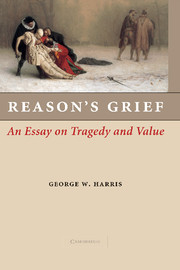Book contents
- Frontmatter
- Contents
- Acknowledgments
- An Aesthetic Prelude
- 1 The Problem of Tragedy
- 2 The Dubious Ubiquity of Practical Reason
- 3 Nihilism
- 4 Pessimism
- 5 Monism: An Epitaph
- 6 Moralism and the Inconstancy of Value
- 7 Moralism and the Impurity of Value
- 8 Best Life Pluralism and Reason's Regret
- 9 Tragic Pluralism and Reason's Grief
- 10 Postscript on the Future: The Idea of Progress and the Avoidance of Despair
- Bibliography
- Index
10 - Postscript on the Future: The Idea of Progress and the Avoidance of Despair
Published online by Cambridge University Press: 30 July 2009
- Frontmatter
- Contents
- Acknowledgments
- An Aesthetic Prelude
- 1 The Problem of Tragedy
- 2 The Dubious Ubiquity of Practical Reason
- 3 Nihilism
- 4 Pessimism
- 5 Monism: An Epitaph
- 6 Moralism and the Inconstancy of Value
- 7 Moralism and the Impurity of Value
- 8 Best Life Pluralism and Reason's Regret
- 9 Tragic Pluralism and Reason's Grief
- 10 Postscript on the Future: The Idea of Progress and the Avoidance of Despair
- Bibliography
- Index
Summary
Cultural criticism finds itself faced with the final stage of the dialectic of culture and barbarism. To write poetry after Auschwitz is barbaric. And this corrodes even the knowledge of why it has become impossible to write poetry today. Absolute reification, which presupposed intellectual progress as one of its elements, is now preparing to absorb the mind entirely.
Theodor Adorno, “Cultural Criticism and Society”If the idea of progress does die in the West, so will a great deal else that we have long cherished in this civilization.
Robert Nisbet, History of the Idea of ProgressIt is not sufficient to simply cite the Holocaust and expect discourse on the question of progress or rationality in human history to end, much as the horror of this event should make us pause and contemplate.
Francis Fukuyama, The End of History and the Last ManDespair is a special form of response to significant loss, distinct from both reason's regret and reason's grief. Reason's regret is the rational/ emotional response to tragic loss where what is lost in the lesser good is not contained in the greater good. Reason's grief is the response to unintelligible loss, where what might be gained is incomparable to what might be lost. And reason's despair is the response to tragic loss when it is rational to think that the bad hopelessly outweighs the good.
Information
- Type
- Chapter
- Information
- Reason's GriefAn Essay on Tragedy and Value, pp. 262 - 288Publisher: Cambridge University PressPrint publication year: 2006
